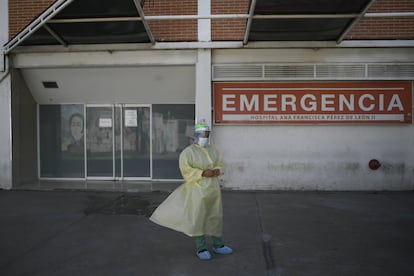A doctor at the Perez de Leon II public hospital in Caracas, Venezuela.Matias Delacroix (AP)
Nine out of ten Venezuelans can only go to the outpatient network or public hospitals of the country's collapsed health system, which has lost 70% of its response capacity since 2016. 58% of citizens also do not have resources for "out-of-pocket expenses", that is, payments attached to clinical services, which in theory should be covered by the State. These are some of the data handled by the Humanitarian Response Program coordinated by Acción Solidaria, one of the most active and solid NGOs in the country, chaired by Feliciano Reyna, which has presented its implementation balance. Its contents reveal the magnitude, origin and duration of the Venezuelan landslide of these years.
The NGO's program has served more than 700,000 people in need since 2018 and has deployed, with international help, a network of doctors and specialists to compare their evolution. Some 9.3 million people in the country have some chronic health problem and have no way to treat it, due to lack of resources or medicines. 57% of the patients surveyed speak of income problems to pay for their medicines, since money is prioritized in food.
This is an ambitious project of humanitarian coverage that was conceived in haste in 2016, when the humanitarian emergency broke out in all its dimensions. Then, the productive collapse and the collapse of the nation's patrimony was added to a terrible shortage of medicine and food, and the collapse of the oil industry. Reyna explains that it is carried out with the assistance of international donors linked to humanitarian management, working with 193 regional organizations and allied volunteers that have been disseminated throughout the regions of the country and that today – while recognizing the inadequacy of these efforts in the existing complexity – are synchronized. "We are not present in all states, but our regional work encompasses them all," he says.
Very prudent in the handling of political language, Reyna has dedicated himself fully to addressing and promoting understanding of the scope of the Venezuelan humanitarian crisis, a consequence of the collapse of the Chavista development model that exploded in 2014. He is convinced of the need for a political agreement between the government and the opposition that prioritizes the country's social emergency. Reyna has even been present at the Miraflores Palace to explain to Maduro and the high government the most urgent elements of social collapse.
"We have a serious, systemic affectation of great proportions throughout the country of the right to health, in addition to an enormous opacity of information," says Natasha Saturno, coordinator of the Program for the Enforceability of Rights of Solidarity Action. Saturno affirms that, "with all responsibility", the impact studies carried out by this organization allow us to affirm that women, children and adolescents are the most affected by the landslide in the health service.
In 399 surveys of the needy population, it was highlighted that one in four women present did not have access to sanitary napkins, and three out of ten had a chronic health situation. Nine million people in Venezuela are food insecure, meaning they can only eat two meals a day, or less, and they don't know what they'll eat the next day.
"The Venezuelan humanitarian crisis is one of the most underfunded in the world in relation to the severity of its impact," says Saturno. "It is a social crisis of political origin and that is why it is imperative that a political agreement be reached that has it as a priority. Many donors and diplomats who see what is happening find it difficult to understand that Venezuela, a country with so many resources, which had moments of prosperity in the past, is in a situation like this," he concludes.
Follow all the international information on Facebook and Twitter, or in our weekly newsletter.

